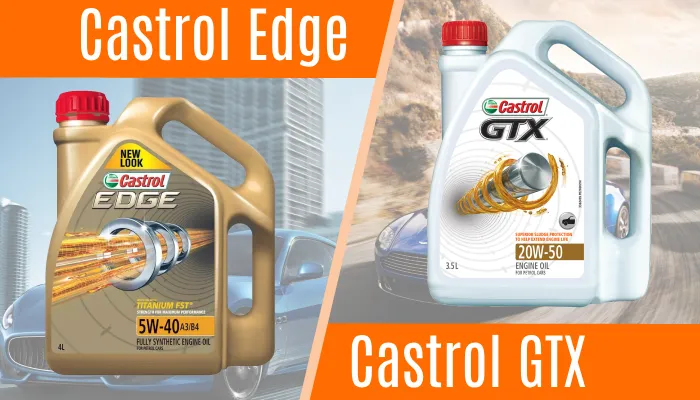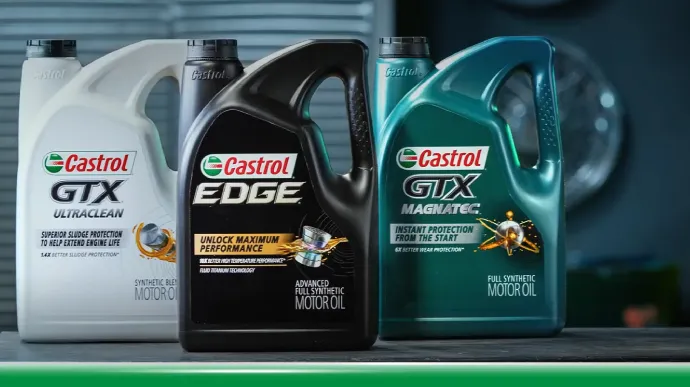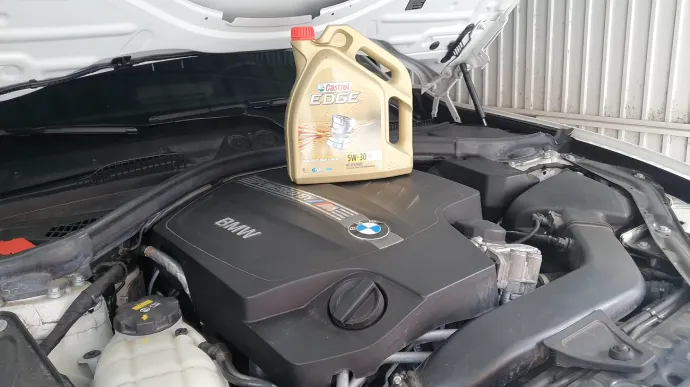Physical Address
304 North Cardinal St.
Dorchester Center, MA 02124
Physical Address
304 North Cardinal St.
Dorchester Center, MA 02124

Motor oil directly impacts your engine’s performance and longevity, so selecting the right oil for your vehicle is essential. Castrol, a renowned name in the world of automotive lubricants, offers two distinct motor oil options, Castrol Edge and Castrol GTX.
Castrol Edge is a fully synthetic oil with a uniform molecular structure, ideal for modern, high-performance engines. Its superior friction reduction and wear protection capabilities cater to demanding conditions but come at a slightly higher price point.
In contrast, Castrol GTX is a synthetic blend, blending conventional and synthetic oils. It offers a cost-effective option for those with older or less advanced engines. It protects against sludge, viscosity breakdown, and thermal issues, making it well-suited for high-mileage applications.
Here, we will explore the key differences between Castrol Edge and GTX motor oil. Get ready to dive into the world of motor oils and discover which one is the best fit for your needs.
No products found.

Several key differences exist when comparing Castrol Edge and Castrol GTX motor oil for your vehicle.
Castrol Edge is a fully synthetic motor oil made entirely from chemically engineered molecules. This composition ensures a high level of purity and performance for your engine.
The uniform-sized molecules in Castrol Edge provide better lubrication and reduced friction, allowing your engine to operate smoothly and efficiently.
On the other hand, Castrol GTX is a synthetic blend that combines conventional mineral oil with synthetic base stocks. This composition is designed to offer protection against sludge, viscosity issues, and thermal breakdown.
By blending both conventional and synthetic components, Castrol GTX provides a balance between performance and affordability.
With its high-quality synthetic composition, Castrol Edge offers longer service intervals of up to 10,000 miles. This means you can go longer without needing an oil change, making it convenient for those who prefer less frequent maintenance.
Conversely, Castrol GTX typically requires oil changes at 7,500-mile intervals. While still a respectable duration, it may require more frequent attention than Castrol Edge. For optimal engine performance and to prevent premature wear and tear, it’s crucial to stick to the recommended service intervals.
Regarding engine compatibility, the main difference between Castrol Edge and Castrol GTX lies in the type of engines they’re designed for.
Castrol Edge is specifically formulated for modern and high-performance engines. Its advanced formula provides superior protection and performance tailored to these engines’ needs.
Alternatively, the Castrol GTX suits older and less advanced vehicle engines. Its blend of synthetic and conventional oil helps protect against sludge, viscosity issues, and thermal breakdown, ensuring the longevity of these engines.
Castrol Edge is a versatile choice that performs well in cold and hot weather conditions, making it suitable for year-round use. It offers top-notch performance and can withstand extreme temperatures.
Contrary to this, Castrol GTX is specifically designed for cold weather conditions and provides effective protection in such environments. While it’s versatile for any car, including those with turbocharged engines, it may not perform as well as Castrol Edge in high-temperature conditions.
When considering the differences between Castrol Edge and Castrol GTX motor oil for your vehicle, you should understand each option’s varying viscosity ranges.
Castrol Edge provides a wider range of viscosity ratings, making it suitable for high-revving engines requiring different lubrication levels. This means it performs exceptionally well in both cold and hot weather conditions. Castrol Edge can be used throughout the year, offering versatility and reliability.
On the other hand, Castrol GTX may not have as wide a range of viscosity options, making it ideal for specific applications, particularly in colder climates. Its viscosity range is designed to provide optimal lubrication and protection in cold weather conditions.
Mileage efficiency refers to how well the motor oil can help improve fuel economy and maximize the number of miles you can drive on a gallon of gasoline.
Castrol Edge is known for its high-performance capabilities, but it may not offer the same level of mileage efficiency as Castrol GTX. Castrol GTX is designed to provide better mileage, making it a preferred choice for high-mileage applications.
Regarding pricing, Castrol Edge is generally more expensive than Castrol GTX. This is primarily because Castrol Edge is a high-quality full synthetic motor oil formulated with advanced performance features. Using premium synthetic base oils and specialized additives contributes to its higher cost.
Alternatively, Castrol GTX is a synthetic blend motor oil that offers a cost-effective solution for those who want the benefits of synthetic oils without breaking the bank. It balances performance and affordability, making it a popular choice for many vehicle owners.

Castrol has a long-standing partnership with BMW and has developed motor oils specifically tailored to meet the stringent requirements of BMW engines.
Castrol’s EDGE Euro line of premium vehicle engine oils has been engineered to exceed the manufacturer’s test limits. It ensures the highest level of protection and performance for your BMW car. Castrol’s commitment to innovation and quality aligns perfectly with BMW’s dedication to engineering excellence.
The superior wear protection of Castrol GTX is evident in its ability to protect critical engine parts six times better than other motor oils. This means that the engine components are shielded from the damaging effects of friction, reducing the chances of premature wear and tear.
Castrol GTX offers 1.3 times better sludge protection than other motor oils. Sludge can accumulate inside the engine, leading to reduced performance and potential engine damage. With Castrol GTX, however, the sludge is effectively cleaned and prevented from forming, ensuring the engine operates optimally.
While Castrol GTX is a reliable and popular motor oil, it may not be the best choice for your high-performance sports car.
High-performance sports cars often have advanced and demanding engines requiring motor oil and superior performance capabilities. Castrol GTX is formulated for older and less advanced engines and may not provide the optimal protection and performance required by your high-performance sports car.
Instead, you should consider using Castrol Edge, a fully synthetic motor oil specifically designed for high-performance vehicles. Castrol Edge offers enhanced protection against wear and improved performance in extreme conditions, making it the ideal choice for your high-performance sports car.
Castrol Edge is specifically formulated to handle the demands of these rigorous applications. Its advanced technology allows it to maintain viscosity even under extreme conditions, providing exceptional protection against wear and tear.
The unique formulation of Castrol Edge ensures that it can withstand high-stress situations, such as towing heavy loads or driving on uneven terrains. Its ability to withstand extreme temperatures and provide superior thermal stability makes it an ideal choice for off-road or heavy-duty vehicles.
Castrol Edge and GTX motor oils should not be mixed to ensure optimal engine performance and protection.
Although it’s technically possible to mix these oils, it may not be ideal, especially for engines that require full synthetic oil. Mixing oils with different viscosity grades can adversely affect the engine’s performance and protection.
It can alter the oil’s ability to flow properly, leading to decreased lubrication and increased wear on engine components. Additionally, mixing oils may compromise the additives and properties specifically designed for each oil type.
The choice between Castrol Edge and Castrol GTX motor oils is a decision that should not be taken lightly. These products cater to diverse vehicle types, driving conditions, and performance demands.
With its fully synthetic formulation and superior performance attributes, Castrol Edge is the top choice for modern, high-performance engines. On the other hand, Castrol GTX, a synthetic blend, shines in its affordability and reliability for older engines and high-mileage applications.
Your decision should hinge on a careful assessment of your vehicle’s needs, budget, and the demands of your driving environment. With these key differences, you can ensure your engine operates at its best, delivering the desired performance and longevity.
Last update on 2026-02-14 / Affiliate links / Images from Amazon Product Advertising API